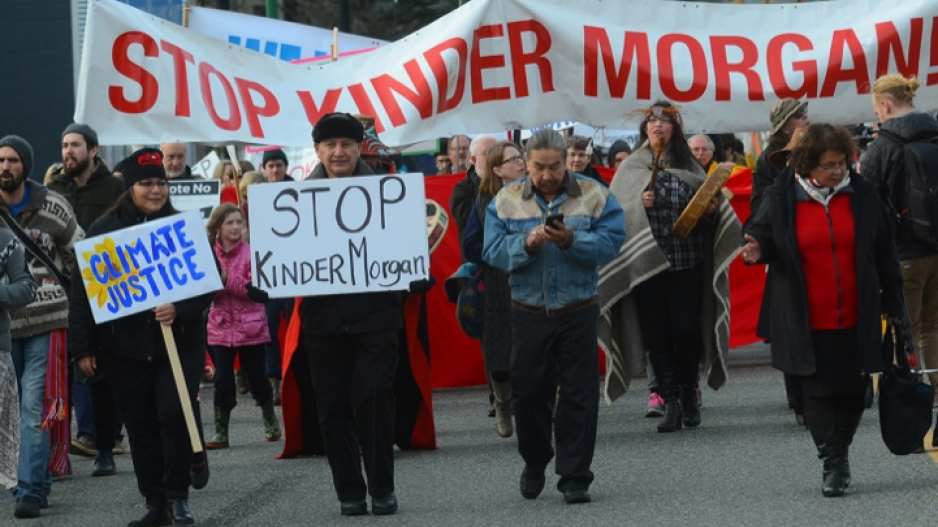As expected, Kinder Morgan Canada (TSX:KML) shareholders have approved the sale of the Trans Mountain pipeline and expansion project to Ottawa for $4.5 billion - literally minutes after the Federal Court of Appeal dealt the project a major setback.
Kinder Morgan confirmed that 99.98% of shareholders voted in favour of selling the beleaguered pipeline project to Canada for $4.5 billion. The expansion is now Canada's headache, and the headache just became a migraine.
Earlier this morning, August 30, the Federal Court of Appeal quashed the order in council that approved the project, sending it back to the drawing board.
Trans Mountain has confirmed that work will now stop on the $7.4 billion expansion, which is almost now certainly going to cost more than that to complete.
"Trans Mountain is currently taking measures to suspend construction related activities on the project in a safe and orderly manner," the company stated in an email to Business in Vancouver.
Canada is now stuck with a project that will almost surely escalate in costs, because the project must now go back to regulators, if it is to proceed at all.
At a press conference in Ottawa, Federal Finance Minister Bill Morneau said his government plans to move ahead with the acquisition of the existing Trans Mountain pipeline and expansion project, saying the deal could close as early as tomorrow, August 31.
Morneau refused to say whether his government will appeal the court decision to the Supreme Court of Canada, or simply go back to the drawing board.
"We will analyze this decision," Morneau said, adding it is 275 pages long, "and we will respond promptly. That is what the court has asked us to do. We will do that, but we have not gotten to conclusions on the exact response."
In either case, it means the expansion project will be delayed.
The last estimate of the expansion was $7.4 billion. But in a proxy statement to shareholders, Kinder Morgan put forward a number of scenarios. One of the scenarios was a completion date of 2021 and a capital cost of $9.3 billion. Given the delay that either a Supreme Court challenge or a regulatory redo will cause, that number is looking more realistic now than $7.4 billion.
The Government of Alberta has agreed to cover up to $2 billion worth of overruns in exchange for equity in the expanded pipeline.
On August 30, the Federal Court of Appeal ruled that the National Energy Board (NEB) failed to properly consider the impacts of increased tanker traffic on the marine environment from an expanded pipeline.
The expansion would increase oil tanker traffic from five to 34 tankers per month.
Because it failed to consider the impacts on the marine environment, including the impact on killer whales, the appeal court said federal cabinet was not fully informed on environmental impacts when an order in council gave the expansion the green light.
That order in council decision is now quashed. The court has ordered that the issue of marine traffic now be referred back to the NEB "or its successor."
The court noted that, despite acknowledging potential impacts on Southern Residents Killer Whales, the NEB considered marine traffic impacts to be incidental, so a full environmental impact assessment on the marine environment wasn't done.
"The unjustified failure to assess the effects of Project-related shipping under the Canadian Environmental Assessment Act, 2012 and the resulting flawed conclusion about the environmental effects of the Project was critical to the decision of the Governor in Council," the court writes. "With such a flawed report before it, the Governor in Council could not legally make the kind of assessment of the project’s environmental effects and the public interest that the legislation requires."
As with the Northern Gateway pipeline project, the court also found that the federal government failed to do a proper job of consulting First Nations. Five First Nations were part of the consolidated federal appeal court challenge.
The court has ordered Canada and its regulators to redo Phase 3 consultations with First Nations.
"Only after that consultation is completed and any accommodation made can the Project be put before the Governor in Council for approval," the court writes.
The court offers the government some hope that the issues it has raised can be dealt with reasonably quickly. It notes that the concerns raised by First Nations like the Tsleil-Waututh are "specific and focussed."
"This means that the dialogue Canada must engage in can also be specific and focussed. This may serve to make the corrected consultation process brief and efficient while ensuring it is meaningful. The end result may be a short delay, but, through possible accommodation, the corrected consultation may further the objective of reconciliation with Indigenous peoples. "




